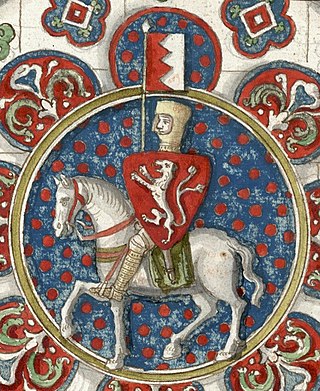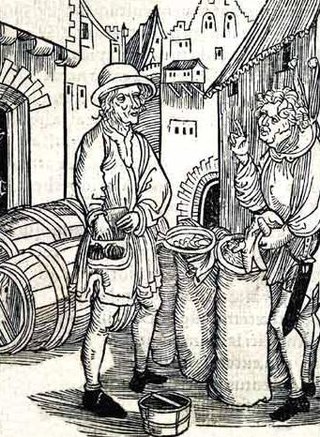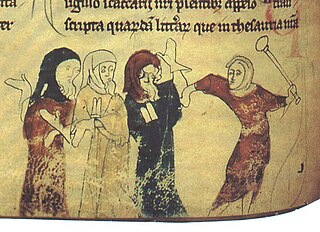Tallage or talliage may have signified at first any tax, but became in England and France a land use or land tenure tax. Later in England it was further limited to assessments by the crown upon cities, boroughs, and royal domains. In effect, tallage was a land tax.

Edward I, also known as Edward Longshanks and the Hammer of the Scots, was King of England from 1272 to 1307. Concurrently, he was Lord of Ireland, and from 1254 to 1306 he ruled Gascony as Duke of Aquitaine in his capacity as a vassal of the French king. Before his accession to the throne, he was commonly referred to as the Lord Edward. The eldest son of Henry III, Edward was involved from an early age in the political intrigues of his father's reign. In 1259, he briefly sided with a baronial reform movement, supporting the Provisions of Oxford. After reconciliation with his father, he remained loyal throughout the subsequent armed conflict, known as the Second Barons' War. After the Battle of Lewes, Edward was held hostage by the rebellious barons, but escaped after a few months and defeated the baronial leader Simon de Montfort at the Battle of Evesham in 1265. Within two years, the rebellion was extinguished and, with England pacified, Edward left to join the Ninth Crusade to the Holy Land in 1270. He was on his way home in 1272 when he was informed of his father's death. Making a slow return, he reached England in 1274 and was crowned at Westminster Abbey.

Simon de Montfort, 6th Earl of Leicester, later sometimes referred to as Simon V de Montfort to distinguish him from his namesake relatives, was an English nobleman of French origin and a member of the English peerage, who led the baronial opposition to the rule of King Henry III of England, culminating in the Second Barons' War. Following his initial victories over royal forces, he became de facto ruler of the country, and played a major role in the constitutional development of England.

John Peckham was a Franciscan friar and Archbishop of Canterbury in the years 1279–1292.

Usury is the practice of making loans that are seen as unfairly enriching the lender. The term may be used in a moral sense—condemning taking advantage of others' misfortunes—or in a legal sense, where an interest rate is charged in excess of the maximum rate that is allowed by law. A loan may be considered usurious because of excessive or abusive interest rates or other factors defined by the laws of a state. Someone who practices usury can be called a usurer, but in modern colloquial English may be called a loan shark.

The Parliament of England was the legislature of the Kingdom of England from the 13th century until 1707 when it was replaced by the Parliament of Great Britain. Parliament evolved from the great council of bishops and peers that advised the English monarch. Great councils were first called Parliaments during the reign of Henry III. By this time, the king required Parliament's consent to levy taxation.

The history of the Jews in England goes back to the reign of William the Conqueror. Although it is likely that there had been some Jewish presence in the Roman period, there is no definitive evidence, and no reason to suppose that there was any community during Anglo-Saxon times. The first written record of Jewish settlement in England dates from 1070. The Jewish settlement continued until King Edward I's Edict of Expulsion in 1290.

The Statute of Westminster of 1275, also known as the Statute of Westminster I, codified the existing law in England, into 51 chapters. Chapter 5 is still in force in the United Kingdom and the Australian state of Victoria whilst part of Chapter 1 remains in force in New Zealand. It was repealed in Ireland in 1983.
In early modern Europe, particularly in Germany, a court Jew or court factor was a Jewish banker who handled the finances of, or lent money to, royalty and nobility. In return for their services, court Jews gained social privileges, including, in some cases, being granted noble status.

The Edict of Expulsion was a royal decree issued by Edward I on 18 July 1290 expelling all Jews from the Kingdom of England, the first time a European state is known to have permanently banned their presence. The date was most likely chosen as it was a Jewish holy day, the ninth of Ab, commemorating the destruction of Jerusalem and other disasters that the Jewish people have experienced. Edward told the sheriffs of all counties that he wanted all Jews expelled before All Saints' Day that year.

The first Jews in England arrived after the Norman Conquest of the country by William the Conqueror in 1066, and the first written record of Jewish settlement in England dates from 1070. Jews suffered massacres in 1189–90, and after a period of rising persecution, all Jews were expelled from England after the Edict of Expulsion in 1290.
History of European Jews in the Middle Ages covers Jewish history in the period from the 5th to the 15th century. During the course of this period, the Jewish population experienced a gradual diaspora shifting from their motherland of the Levant to Europe. These Jewish individuals settled primarily in the regions of Central Europe dominated by the Holy Roman Empire and Southern Europe dominated by various Iberian kingdoms. As with Christianity, the Middle Ages were a period in which Judaism became mostly overshadowed by Islam in the Middle East, and an increasingly influential part of the socio-cultural and intellectual landscape of Europe.
The Statute of Jewry was a statute issued by Henry III of England in 1253. In response to widespread anti-Jewish sentiment, Henry attempted to segregate and debase England's Jews with oppressive laws which included imposing the wearing of a yellow Jewish badge to invite the Christian public's disdain.
Events from the 1270s in England.
Adam de Stratton was a royal moneylender, administrator and clergyman under Edward I of England. He advanced professionally through the patronage of the earls of Devon, and became Chamberlain of the Exchequer and steward of Isabella, Countess of Devon. At the same time he made himself an enormous fortune through moneylending, primarily by acquiring debts from Jewish moneylenders. His business methods were dubious and often involved various illegal activities. In 1290 he fell victim to an investigation of corruption in the royal administration, and from 1292 until his death— no later than 1294—he was held in prison. Stratton has been called by a modern historian "the greatest and probably the most unscrupulous of thirteenth-century money lenders, who eventually met the fate he deserved."
The Exchequer of the Jews was a division of the Court of Exchequer at Westminster which recorded and regulated the taxes and the law-cases of the Jews in England and Wales. It operated from the late 1190s until the eventual expulsion of the Jews in 1290.
Economic antisemitism is antisemitism that uses stereotypes and canards that are based on negative perceptions or assertions of the economic status, occupations or economic behaviour of Jews, at times leading to various governmental policies, regulations, taxes and laws that target or which disproportionately impact the economic status, occupations or behaviour of Jews.

The Toleration Act 1689, also referred to as the Act of Toleration, was an Act of the Parliament of England. Passed in the aftermath of the Glorious Revolution, it received royal assent on 24 May 1689.
British Jews have experienced antisemitism - discrimination and persecution as Jews - since a Jewish community was first established in England in 1070. They experienced a series of massacres in the Medieval period, which culminated in their expulsion from England in 1290.
Joseph of Chauncy, also known as Joseph of Cancy, was an English religious knight. He was Grand Prior of the Knights Hospitaller in England from 1273 to 1281. He served as Royal Treasurer of the Order from 1273 to 1280.










